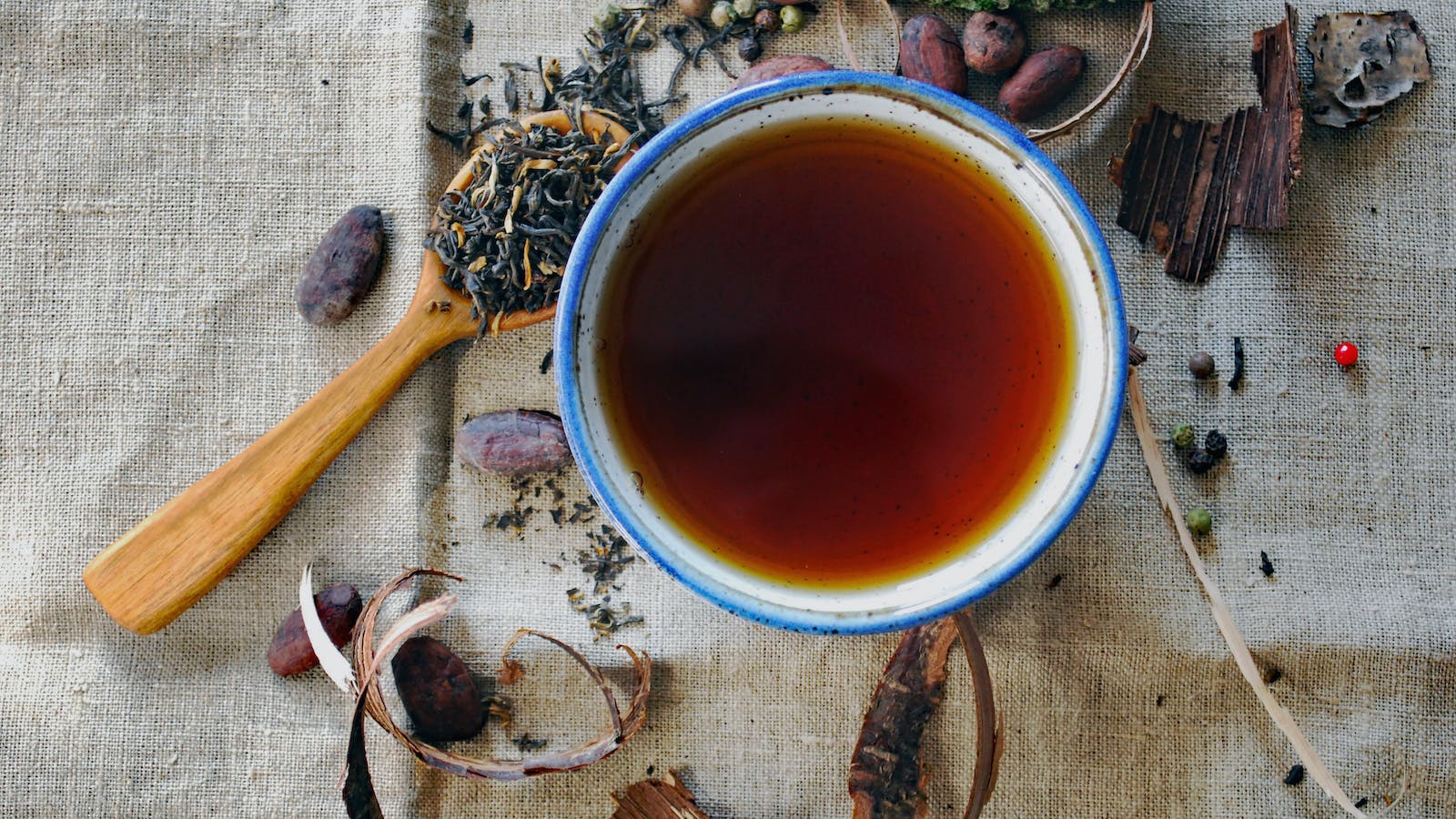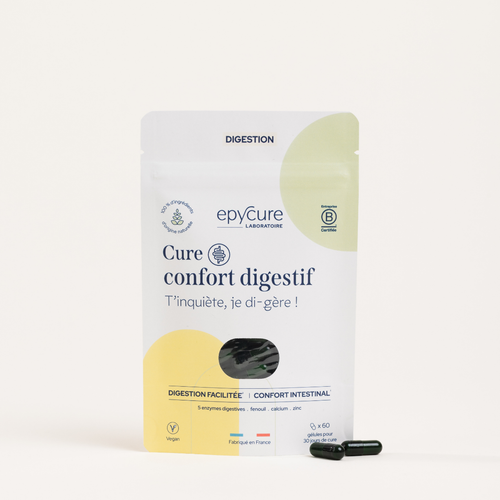Many people are affected by digestive disorders. In fact, 48% of adults suffer from it! Medications, stress, meals that are too fatty or too heavy taken on the go, limited enzyme production, aging... are many factors that can alter our digestion.
The stomach, considered our second brain, is very sensitive to it. When its balance is disrupted, repercussions on our body are quickly observed: bloating, stomach pain, constipation, nausea, acid reflux, fatigue sometimes even with pimples and low morale.
But ultimately, what does digestion consist of? It is a process that breaks down food in the digestive system and transforms it into smaller particles. They can then be absorbed and pass into the bloodstream. For the breakdown of food and the absorption of nutrients, the body needs digestive enzymes which act in the mouth, stomach, intestine and pancreas. Complete digestion takes several hours.
It is imperative to monitor our digestion and take care of it because the body mobilizes a lot of energy to fulfill this mission.
To naturally combat difficult digestion, there are good reflexes to adopt and tips to try such as hydration, massages, aromatherapy, food supplements and many others.
Hydrate properly
We very often hear that we should not drink during meals because this will cause gastric juices to be diluted with water and cause a feeling of bloating. No study has ever shown that drinking water while eating reduces the effectiveness of digestive enzymes and therefore slows down digestion. Indeed, the digestive system is capable of adjusting its production of gastric juices depending on the meal consumed. It is essential to hydrate well and therefore drink plenty of fluids throughout the day, especially when you are thirsty. It is recommended to drink at least 1.5 L per day.
If the idea of drinking 1.5 L of water per day scares you, you can completely change its taste by preparing teas and herbal teas. In addition to helping you hydrate, they can promote better digestion depending on the plants used. Certain plants can actually aid digestion by stimulating gastric juices.
However, it is not recommended to drink your tea just after a meal because the tannins present in the drink can slow down the enzymatic activity of the digestive system and therefore slow down digestion. Wait an hour before drinking it.
Take the time to eat
Many of us have gotten into the habit of eating very quickly, mostly on the go. However, it takes about 20 minutes for the brain to understand that we are eating. It therefore also takes 20 minutes to release the hormones responsible for satiety as well as the enzymes allowing good digestion. This is why eating mindfully, slowing down and listening to the signals of satiety sent by the body will help improve our digestion. Being aware of what we eat means letting our senses appreciate our meal: smelling it, analyzing its colors and tasting it by chewing gently. In addition, this little ritual allows you to anticipate the flavors of a food and thus leads to the secretion of saliva and digestive juices leading to better digestion.
So think about your chewing: chew your food correctly, as slowly as possible, to produce more saliva. This will allow you to swallow smaller pieces, which are more easily broken down in the intestines. You can find tips that encourage you to take the time to eat. For example, try putting your cutlery down on the table between each bite to slow down the pace. Finally, to digest better, the environment in which we eat is essential. Avoid all kinds of screens at the table, whether television, tablet or smartphone. The goal is to think about your plate and savor it in order to salivate and prepare your digestion.
Choose your diet wisely
To promote better digestion, it is of course advisable to pay attention to your diet. There is no list of “miracle” foods since digestive comfort depends on the microbiota and individual sensitivity. Generally speaking, some foods are still recommended and others are not.
Fibers are essential for good digestive functioning because they help regulate intestinal transit by increasing the volume of stools (in case of constipation) and by capturing water from the digestive tract (in case of diarrhea). They are found in fruits (apple, pear, prunes, apricot, raspberry, etc.), vegetables (peas, carrots, beets, fennel, artichokes, etc.), legumes (lentils, dried beans, soya, etc.) and cereals (wheat bran, oats, which can be found in starchy foods). You have to be careful because some fibers can cause bloating, gas and diarrhea by fermenting in the colon. This is the case for certain fruits and vegetables such as cabbage, salsify and artichokes.
It should be noted that raw vegetables (raw vegetables) irritate the digestive system for the most part, so we should favor the consumption of cooked vegetables, which are more digestible.
Certain strong spices such as chili should be avoided because, being rich in capsaicin , they are likely to cause digestive discomfort. Conversely, ginger, licorice, cinnamon and cardamom are known to facilitate digestion and combat intestinal pain.
Lactose in yogurt, cow's milk, and fermented cheeses can lead to bloating and heartburn because, as adults, lactase is no longer secreted to digest lactose. This is why today there are lactose-free cheeses and milks and yogurts whose ferments produce lactase.
Finally, you should avoid coffee, the caffeine of which increases gastric acidity, fatty foods which slow down digestion, those which ferment and promote the formation of gas, or those which promote digestive disorders such as carbonated drinks, chewing gum. and sweeteners.
To exercise
Exercise is also a great way to support digestion. If you are prone to digestion problems, it is advisable to take a digestive walk after your meals. Indeed, a walk may seem trivial to you, but ten minutes are enough to boost the body and the activity of the digestive system and therefore promote digestion.
On the contrary, the digestive nap reduces the efficiency of digestion because, when lying down, food remains more in the stomach. In addition, by lying down and remaining inactive after a meal, it is possible to put pressure on the digestive system which will have more difficulty digesting. It is recommended to wait 2 or 3 hours before sleeping.
Finally, to digest better in the long term, you can turn to certain sports such as yoga or swimming to exercise every day or at least every week. This way you develop your abdominal muscles and help your digestive system work better.
You can also do breathing or relaxation exercises to stimulate digestion and, above all, fight stomach pain. Indeed, most digestive ailments are due to stress. So, yoga, sophrology or other relaxation methods can help you relieve them.
Turn to plants
It is possible to find natural solutions in our environment to improve digestion when our lifestyle is not enough. There are many plants and essential oils known to promote better digestion. You can use them in the form of herbal tea, for example by mixing certain plants yourself.
Mint is known for its effects on digestion. In the form of essential oil or simply leaves, it helps regulate the digestive system and therefore reduce digestion problems. Mint essential oil helps in particular to act on stomach aches, nausea and bloating. To feel the effects, simply add a few mint leaves or 2 drops of EO to your infusion.
Spices such as turmeric or ginger are also useful for promoting the secretion of gastric juice and speeding up digestion.
We also find fennel, verbena and chamomile which facilitate the digestion of food and act against bloating. Licorice, like peppermint, calms heartburn and activates intestinal transit. Finally, savory has a soothing role on the entire digestive system. It reduces spasms and speeds up digestion.
Food supplements
The level of digestive enzymes in our body is sometimes insufficient. In fact, this rate is not constant over time since it decreases with age. Thus, the digestion phenomenon can no longer be as effective as before and we digest poorly.
To strengthen enzyme production, it is possible to turn to food supplements.
There are food supplements capable of promoting good digestion. They can be composed:
- enzymes (proteases, carbohydrases, lipases) which will improve the digestion of carbohydrates, lipids and proteins;
- plants (ginger, lemon balm, chamomile) which will reduce heaviness and bloating
- or even probiotic strains which will act on the microbiota by strengthening the digestive flora.



